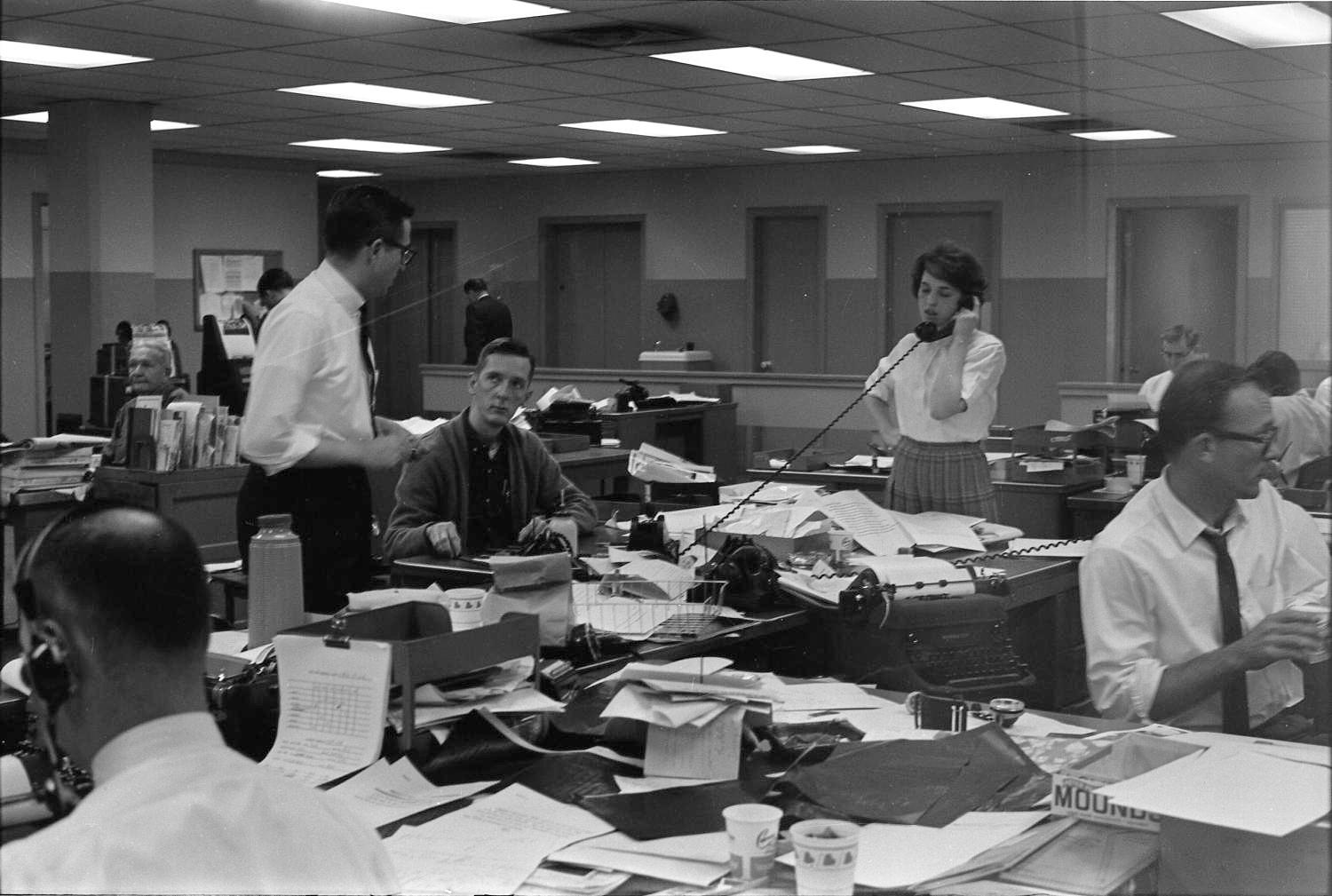Being a university reporter for the Kansas City Star and Times meant writing about sports much of the time. During football season, each Monday through Thursday at 5 o’clock, I’d meet with coach Jack Mitchell near the practice field. He’s brief me and the sports editor of the Lawrence Journal-World on preparations for the next game. I’d go straight to the Western Union office in downtown Lawrence to tap out a short piece, to be Telexed to the sports desk in Kansas City for the next morning’s Times.
On those five Saturdays each fall that the Jayhawks played in Memorial Stadium, I’d join two Star sports writers in the press box—a big step up from the little shack atop the bleachers in Sulphur Springs. All three of us had specific assignments. One of the visiting writers wrote the main game story, the other a feature piece. My task was first to write a short piece to appear on the front page of the last edition of that afternoon’s Star and then to go to the visitor’s locker room to interview its coach and whichever players had a standout day.
Sitting next to the three of us in the press box was a Western Union employee with his Telex keyboard, which resembled that of a typewriter. The game would end right on the deadline for Saturday’s last edition. So my drill went like this: At the half, I’d type two paragraphs summarizing the game thus far and hand it to the WU employee to transmit to Kansas City. At the end of the third quarter, I’d write another paragraph, to be appended by the sports desk to the first two paragraphs. And at the closing buzzer, I’d rip from my typewriter a fourth paragraph to lead the story, and off it would go. Some weeks these little narratives would be top story on the final edition’s front page (alas, without a byline). Then off I went to the locker room, my notes from interviews to be given to the two writers from the main office. I’ve always liked football, so these tasks were enjoyable.
Just as enjoyable was talking to Jack Mitchell. He was a personable fellow liked by almost everyone. Too bad he wasn’t really very smart or even a very gifted coach. With Gale Sayers gaining almost 4,000 yards in 1964, the Jayhawks won six games, but without Sayers in 1965, just two. Alumni were not happy, and after the 1966 season (2-7-1) a job was found for Mitchell as publisher of the Wellington Daily News in southern Kansas. Hugely ironic for me is that Jack’s replacement was Pepper Rodgers from Georgia Tech, whose son Rick would marry my stepdaughter Nicole many years later. By the way, Pepper took the Jayhawks to the Orange Bowl in his first season as coach.
Not so enjoyable was basketball season. K.U. basketball then and now had a huge following, but this sport has always left me cold. In addition, I had little to do at these games except to watch them from the press table and then go to the visitor’s locker room to chat people up and type my notes quickly for the writer sent to cover the game. Mainly I let other, more knowledgeable people ask the questions and quietly took notes. I did this 15 or so times a season for two years. Small wonder I couldn’t watch a compete basketball game again until I was in my 50s.
But there was one big sports event in 1965 that got me on the top of page one, this time with my name attached. After basketball, track was the signature sport at KU, and for 18 years Bill Easton directed this program, with great success. But on the morning of April 20, word got out that Easton had been sacked by the school’s new athletic director, and I bolted my classes to report the story and call it in for that afternoon’s Star. The long and short of it: Easton had become something of a prima donna, and had vowed that his track budget was untouchable. That worked with the former athletic director, but not with Wade Stinson. Easton told me, “I had no choice. I had to let him fire me.”
That afternoon, I was on the field at Memorial Stadium as Easton, his voice often breaking, explained to the track team what had happened. He said he would finish that season and told the team: “What we have to do is to get together. We’ve got to do the greatest job now we’ve ever done. We did it before and we’ll do it again.” Then he walked off the field.
Great hue and cry followed on campus, earning me a lot more money filing stories. Students even hung a dummy named “Wade Stinson” in effigy. But four days after the firing, as petitions circulated to restore Easton to his job, KU hired his assistant as the new track coach. So much for Bill Easton, and it concluded a dramatic sports story for this kid, one whose final score was Wade 1, Bill 0.

Fred, I can see that you don’t LIKE basketball, but not much explanation of why you HATE it. And in the 21st century, expecially at the [professional] college level – like KU – it has its downside. But millions of people love it, and some [Yrs Truly] still ‘play at’ it, even as an Advanced Age.
Waiting for another railroad post in your “Trains” blog!!